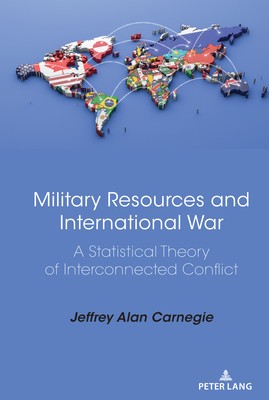
- We will send in 10–14 business days.
- Author: Jeffrey Alan Carnegie
- Publisher: Peter Lang Inc., International Academic Publishers
- ISBN-10: 1433155915
- ISBN-13: 9781433155918
- Format: 15.2 x 22.9 x 1.3 cm, hardcover
- Language: English
- SAVE -10% with code: EXTRA
Reviews
Description
Do leaders make war decisions individually or do they consider other ongoing conflicts? Most researchers assume dyadic independence out of convenience. In this book, Jeffrey Alan Carnegie presents evidence that this is a faulty assumption. First, he develops a formal theory in which limited military resources act as a constraint on the ability of leaders to engage in international conflicts. Country leaders plan accordingly by considering the entire picture of conflicts. This theory, in contrast to dyadic dependence, implies a different data-generating process for international conflicts. Second, he tests both theories using summary statistics, network analysis, and logistic regression. All three methods show strong support for military resource division theory. Carnegie further shows that the dependent effects change with time, even when controlling for polarity. The effects also differ between regions, which implies cultural factors at work. Third, he suggests for the future that researchers use multiple methods to account for different types of dependencies, because no single method can address them all. He shows how to make the best use of logistic regression and social network analysis for conflict statistics. He offers suggestions to policy makers for how best to incorporate this theory in analysis. Finally, Carnegie concludes by comparing predictions of the two theories regarding conflicts for the United States, especially Iran and North Korea. This book will be of interest to conflict researchers in academia and government who want to better understand the effect of coalitions on modern warfare.
EXTRA 10 % discount with code: EXTRA
The promotion ends in 16d.23:00:36
The discount code is valid when purchasing from 10 €. Discounts do not stack.
- Author: Jeffrey Alan Carnegie
- Publisher: Peter Lang Inc., International Academic Publishers
- ISBN-10: 1433155915
- ISBN-13: 9781433155918
- Format: 15.2 x 22.9 x 1.3 cm, hardcover
- Language: English English
Do leaders make war decisions individually or do they consider other ongoing conflicts? Most researchers assume dyadic independence out of convenience. In this book, Jeffrey Alan Carnegie presents evidence that this is a faulty assumption. First, he develops a formal theory in which limited military resources act as a constraint on the ability of leaders to engage in international conflicts. Country leaders plan accordingly by considering the entire picture of conflicts. This theory, in contrast to dyadic dependence, implies a different data-generating process for international conflicts. Second, he tests both theories using summary statistics, network analysis, and logistic regression. All three methods show strong support for military resource division theory. Carnegie further shows that the dependent effects change with time, even when controlling for polarity. The effects also differ between regions, which implies cultural factors at work. Third, he suggests for the future that researchers use multiple methods to account for different types of dependencies, because no single method can address them all. He shows how to make the best use of logistic regression and social network analysis for conflict statistics. He offers suggestions to policy makers for how best to incorporate this theory in analysis. Finally, Carnegie concludes by comparing predictions of the two theories regarding conflicts for the United States, especially Iran and North Korea. This book will be of interest to conflict researchers in academia and government who want to better understand the effect of coalitions on modern warfare.


Reviews